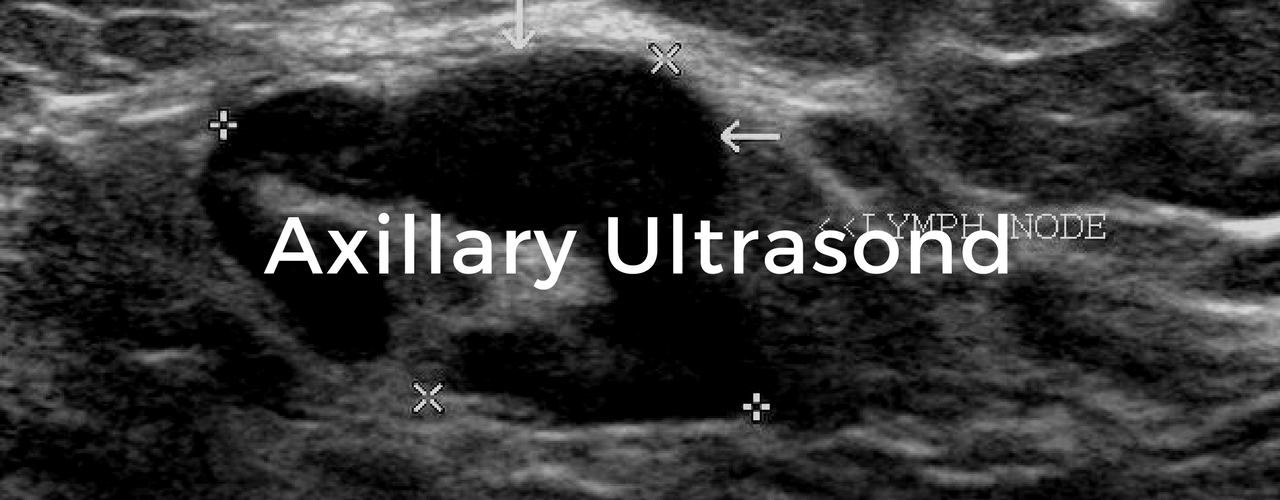Questions for your Breast Surgeon:
- Will you ultrasound my axillary lymph nodes today?
- If not, will you order an axillary ultrasound by a radiologist?
- Would my treatment change if we found cancer in my axillary nodes?
- What are the benefits of Neoadjuvant Chemo?
- Why is Neoadjuvant Chemo recommended more now?
Why ultrasound my axillary lymph nodes before surgery?
At diagnosis, one third of patients already have cancer in the lymph nodes under their arm (axilla). When the “Axillary Lymph Nodes” are involved with breast cancer your cancer is more threatening one. This information can dramatically change your treatment options.
Studies have shown that “positive” axillary lymph nodes are commonly missed by your breast surgeon’s physical examination. A 5-minute ultrasound of your axilla can more accurately find cancer in these nodes. A pre-operative axillary ultrasound is a “cutting edge” advance in breast cancer care. Make sure to ask your breast surgeon about an axillary ultrasound when they are examining you. Many large cancer centers routinely utilize pre-operative axillary ultrasounds.
AN ABNORMAL AXILLARY NODE
When a node has enough cancer growing within it, it can look abnormal as in the below image.

ULTRASOUND NEEDLE BIOPSY OF AN AXILLARY NODE
This simple procedure is identical to an ultrasound-guided, minimally invasive breast biopsy. It is performed using local anesthesia and can be completed in 10 to 15 minutes. A biopsy can confirm if cancer has spread to your axillary lymph nodes.

How can this change my treatment plan?
If an obviously abnormal node is found before surgery, then you have a more serious cancer. If appropriate, an ultrasound guided needle biopsy can be performed to confirm the node is involved with cancer. If you have cancer in your nodes, you will likely require chemotherapy either before (neoadjuvant chemotherapy) or after surgery (adjuvant chemotherapy). Regardless of the findings of an axillary ultrasound, a surgical evaluation of your axillary lymph nodes will be needed when you undergo a definitive breast cancer surgery. The surgical procedures used today for lymph nodes are a “sentinel node biopsy” or an “axillary dissection.”
What are the benefits of knowing you have involved nodes?
Knowing you have “node positive” breast cancer before surgery can empower your breast cancer team to search for more sophisticated treatment options. A simple axillary ultrasound for early stage breast cancer identifies more “node positive” patients. If you are found early in your journey to have node positive breast cancer, more pre-operative treatment options may be considered. We list some of the treatment benefits below.
Multidisciplinary Cancer Team
Lymph node “positive” breast cancer requires a more sophisticated treatment approach. An axillary ultrasound can help determine if you would benefit from a “multidisciplinary team” approach early on in your care, before surgery. Ask your breast specialists to present your unique cancer situation to their team so you will benefit from new ideas and cutting-edge treatment advances.
Neoadjuvant Chemotherapy
When you know you have involved lymph nodes at diagnosis, you likely will be offered chemotherapy at some point in your treatment. There can be distinct advantages to having chemotherapy before surgery, rather than afterwards. This is known as neoadjuvant chemotherapy. This complex decision is worth discussing with your breast surgeon. Breast surgeons choose the initial direction of your entire breast cancer treatment plan. An axillary ultrasound can better identify if you are a candidate for neoadjuvant chemotherapy. Take our lesson on “Neoadjuvant Chemotherapy” to learn more about the potential benefits of this treatment approach.
Patient-Friendly References:
- Annals of Surgical Oncology
This medical journal article (here) reviews some benefits of axillary ultrasound for breast cancer. “Value of preoperative ultrasound-guided axillary lymph node biopsy for preventing completion axillary lymph node dissection in breast cancer: a systematic review and meta-analysis.” Annals of Surgical Oncology. 2014 Jan;21(1):51-9.
- Journal of the American College of Surgeons
This medical journal article (here) explains how finding an abnormal axillary lymph node can change the direction of your breast cancer treatment plan. “Ultrasound-Guided Core Biopsy: An Effective Method of Detecting Axillary Nodal Metastases” Journal American College of Surgeons. 2012 Jan;214(1):12-17.
More Detailed References:
If you want to get deep into the details, this free 200-page pdf document (here) has guidelines to help clinicians to make treatment recommendations about nearly all aspects of breast cancer. You can easily register (here) as a non-professional to get access and more information about breast cancer. The National Comprehensive Cancer Network is the leading organization in developing clinical guidelines.



